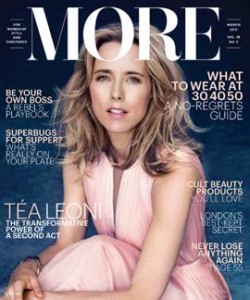 That’s right. Not every woman after divorce is devastated, and some even move on to bigger and better things.
That’s right. Not every woman after divorce is devastated, and some even move on to bigger and better things.
Her nearly three decades of experience in the industry has taught Téa Leoni about the power of reinvention.
Back with a new hit TV show (Madam Secretary), and with her public divorce in her past, Téa is turning fear into motivation.
In the March 2015 issue of MORE magazine, on newsstands now the mom of two opens up about tuning out the misogyny and ageism in Hollywood, and learning to live life on her own terms.
On misogyny and ageism in Hollywood:
“[Brett] Ratner (her director on the 2000 film The Family Man)—whom I really like, by the way—was going around telling people that despite my age, I was ‘still doable.’ I think I was 34 then. And he was something like 28. I asked myself, ‘Do I still care about that?’ And at that time, I did. I felt that pressure to be ‘doable.’ It was the meanest thought I’d had for myself in a long time.
“Thankfully, I’ve moved past all that. Chasing youth is a war I’m not going to win. It’s not like I’m thrilled to turn around and catch my can in the mirror, but I can see now how much of my happiness could be a victim of trying to stay young and desirable. And it feels like peace and victory to be relieved of that burden.”
On trying not to be too hard on herself:
“Fear is terrible. I’m no different than anyone else. I don’t want people to judge me and find me wanting. I spent some time in my marriage being fearful of how it would go, or end, or not end, and I think, with the kids, some fear as a new mother. I didn’t know what I was doing. I remember packing the freaking diaper bag. I would get obsessed. If there is an earthquake, can we survive for two weeks on the contents?”
On what attracted her to Madam Secretary:
“I felt my kids were ready for me to take on a potentially multi-year project. Shooting in New York, working with Morgan Freeman [the show’s co-creator] and getting a paycheck sealed the rest.”
On the surprising inspiration behind her character:
“Above everything, I want my character to be nonjudgmental. People assume that inspiration comes from Hillary Clinton or Madeline Albright. It doesn’t. It comes from my dad. I’ve never once in my life heard him engage in gossip. He would have made a great secretary of state.”
On what she appreciates MORE as she ages:
“How much pain I caused my parents. I’m sorry I scared the bejesus out of you with all my big ideas: To float out the second-story window with an umbrella like Mary Poppins into a pile of leaves below when I was five. To ride my bike off the big rocks into the ocean on a dare when I was eight. To sneak out and see Rocky Horror at midnight when I was 13. To drop out of college. To try chewing tobacco. To be an actor.”
On her early career:
“I had one long thread of shitty advice throughout my career, which was, ‘You have to do this in order to do that.’ So I did some projects that were lacking. I was ‘the chick of the flick.’”
On her industry reputation as a “Pass-a-dena”:
For every project I do, there are a lot I don’t. People have asked if I’m lazy. In a way it’s flattering. But the truth is, if you’re going to pull me away from my children, I need to have some connection to the work.”
On what’s more important to her than an Oscar:
“People tell me I’ve never really made it. They say, ‘You don’t have an Oscar.’ There’s not an accolade in Hollywood that could replace time with my kids. At this stage of my life, it’s not about contentment. Or appealing to 20-year-olds. Or awards. It’s about finding something more. As I tell my daughter, ‘Hear your voice first.’”
On what the world can use a little MORE of:
“People who understand that the left lane is for passing only.”

